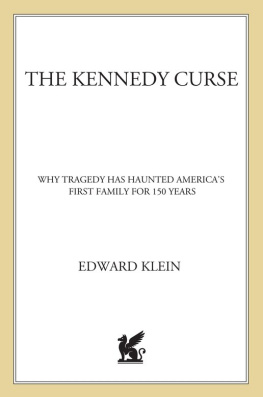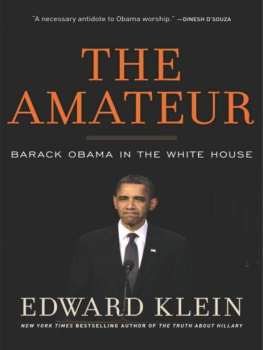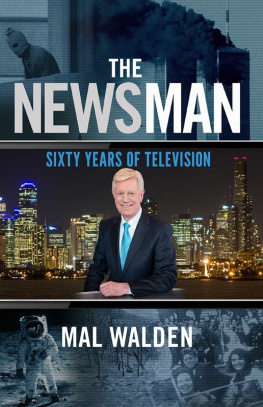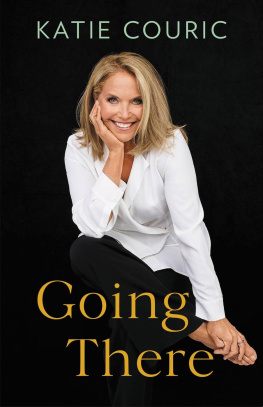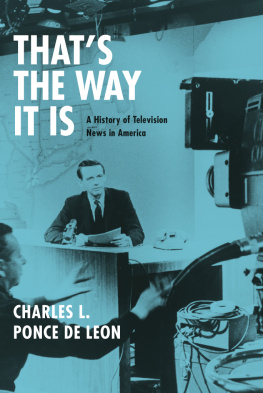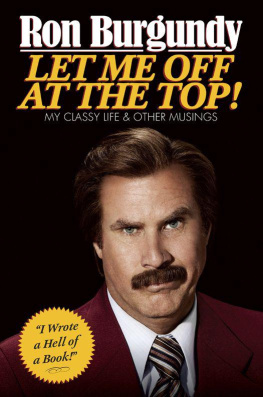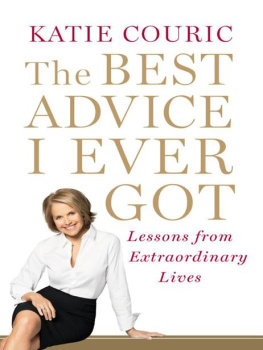
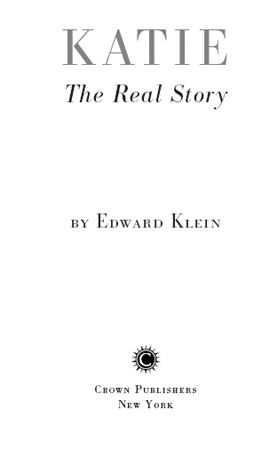
Contents
For Jack, Annalise, Nathaniel, and Ryan
I had a sort of perfect life until I was forty. Jay used to say
I was born on a sunny dayeverything just sort of went
right for me. Everything changed when I turned forty.
KATIE COURIC
PART I
Let Them Know Youre Here!
Chapter One
The Stuff of Legend
K ATIE COURIC WAS IN TEARS.
Im going to be fired! she said.
It was Thanksgiving week in 1980, and Katie was in CNNs brand-new Washington bureau on Wisconsin Avenue. She was seated on a big cardboard packing box (most of the office furniture hadnt arrived yet), pouring out her heart to Jean Carper, the networks medical correspondent.
Can you believe it, Jean? she said. Theyre going to fire me!
Katie was a small fireplug of a woman (five-foot-two on a good-posture day), and from her perch on the packing box, her feet barely reached the floor. Thanks to her diminutive size, bubbly personality, and a wide mouth that revealed a set of tiny, childlike teeth, Katie could have been mistaken (and often was) for a high school cheerleader.
Nearly six months beforeon June 1, 1980Ted Turner and a handful of veteran journalists had launched the countrys first twenty-four-hour-a-day cable news network, and these tough newsmen had trouble taking the girlish Katie seriously. It wasnt that she lacked the smarts or get-up-and-go. On the contrary, Katie was a ball of energy, an entry-level VJ (or video journalist) who was willing to work for $3.35 an hour25 cents above the federal minimum wage. She came into the CNN Washington bureau on her days off and volunteered to run cameras, write scripts, and produce live stand-ups for correspondents like Jean Carper.
Jean had taken a shine to Katie and was distressed to hear that her protge was going to be fired. The ax couldnt have fallen at a worse time. It was the beginning of the holiday season, and Katie was getting a pink slip instead of the Christmas promotion she had been hoping for. It looked as though Katie was all washed up in the television news business at the tender age of twenty-three.
Jean, Katie pleaded, what am I going to do?
Who told you youre getting fired? Jean asked.
Stuart, said Katie.
She was referring to Stuart Loory, the managing editor of CNNs Washington bureau.
Why would Stuart do a thing like that? Jean asked. Ive told himevery time youve gone out to help me produce a segment, youve been a real asset.
Katie hadnt confided in Jean Carper that she didnt want to be a producersomeone whose name flashed on the screen for a split second during the credit roll at the end of a show. She had bigger dreams. She dreamed of being a star, and not just a relatively minor star like Jean Carper, but a major star, the biggest kind of star, an anchor at a major network with a show of her own.
Katie had been obsessed with this dream since college; in fact, she once told a college boyfriend that her goal was to become the next Barbara Walters, who at the time was co-anchoring ABCs World News Tonight with Harry Reasoner. As soon as Katie received her degree in American studies from the University of Virginia, she talked her way into her first job in TV journalismas a desk assistant in the Washington bureau of ABC News.
My first day at ABC, she recalled in an interview with Washingtonian magazine, Sam Donaldson came into the newsroom, jumped on a desk, and started singing K-K-K Katy.
During her brief stint at ABC, Katie was responsible for making coffee, answering phones, and getting ham sandwiches for anchorman Frank Reynolds.
It was the most humiliating job I ever had, Katie said.
A few months later, she switched to CNN, because advancement at the fledgling cable network was likely to come a lot quicker than at ABC. Ever since then, she had been pestering CNNs Washington bureau chief, Stuart Loory, to give her a shot on-camera. But Loory, a hard-bitten newsman who had been managing editor of the Chicago Sun-Times, didnt think Katie had the right stuff to become a reporter.
To begin with, Katie suffered from stage fright. In front of a camera, her voice shook, her hands fluttered, her nose ran, and she stumbled over words. Her high-pitched, untrained voice didnt match the aura of grave moral authority that the startup network was striving so hard to achieve.
Her looks didnt help, either. The simple truth was, Katie didnt fit the mold of CNNs female anchorspretty young things with long blonde hair. Katie might be cute, but she wasnt conventionally beautiful, and her mop of dark brown hair didnt add much to the overall package.
Even so, Katie had been given several opportunities to prove herself on air.
One morning, an anchor in the Washington bureau failed to show up, and the producer running the show put Katie on in his place, recalled Reese Schonfeld, who had cofounded CNN with Ted Turner and was its first CEO. I got a call from one of the guys on the news desk in Atlanta. Hey, look, theyve got Katie on, he told me. I turned on the TV and, sure enough, there was Katie, white-faced and scared stiff, and looking all of fourteen. I called the producer in Washington and told him, Never put anyone on the network without first asking me or the producer in Atlanta.
Reese Schonfelds orders had the force of law at CNN, and everyone interpreted his words to mean: Never put Katie on the air again. In the face of such an edict, Katies chances of becoming an on-air personality at CNNmuch less an anchorwere nil. And now it appeared that Stuart Loory had sealed her fate by giving Katie her walking papers.

JEAN CARPER PLACED a consoling hand on Katies shoulder.
Let me see what I can do, she said.
Oh, would you, Jean? Katie said. Id be so grateful.
Ill call Reese.
Jean Carper didnt waste any time making good on her promise to intervene with Reese Schonfeld, the man who ran CNN on a day-today basis.
Katies in tears, Jean told Schonfeld when she reached him on the phone in Atlanta. Shes crying because Stuart Loorys about to fire her. I think itd be a big loss to CNN if that should happen.
Reese Schonfeld was receptive to Jean Carpers appeal. She was one of his most valuable correspondents and had broken many important medical stories that were popular with CNNs viewers. Whats more, although Schonfeld was loath to admit it, he was ready to believe the worst about his Washington bureau chief, Stuart Loory.
Jealousy and competition colored the relationship between Schonfeld, the top dog at CNNs headquarters in Atlanta, and the prickly Loory, who ran the Washington bureau as though it was his independent fiefdom. From day one, Loory was a thorn in Schonfelds side. As far as Schonfeld was concerned, Loorys background in print journalism only aggravated the situation, since it made Loory a poor judge of TV talent.
After he hung up with Jean Carper, Schonfeld was struck by a thought. He recalled that a popular CNN husband-and-wife anchor team, Don Farmer and Chris Curle, had expressed an interest in bringing Katie down to Atlanta to work as a junior producer on their afternoon show, Take Two, which was modeled after The Today Show. In fact, now that Schonfeld thought about it,
Next page

